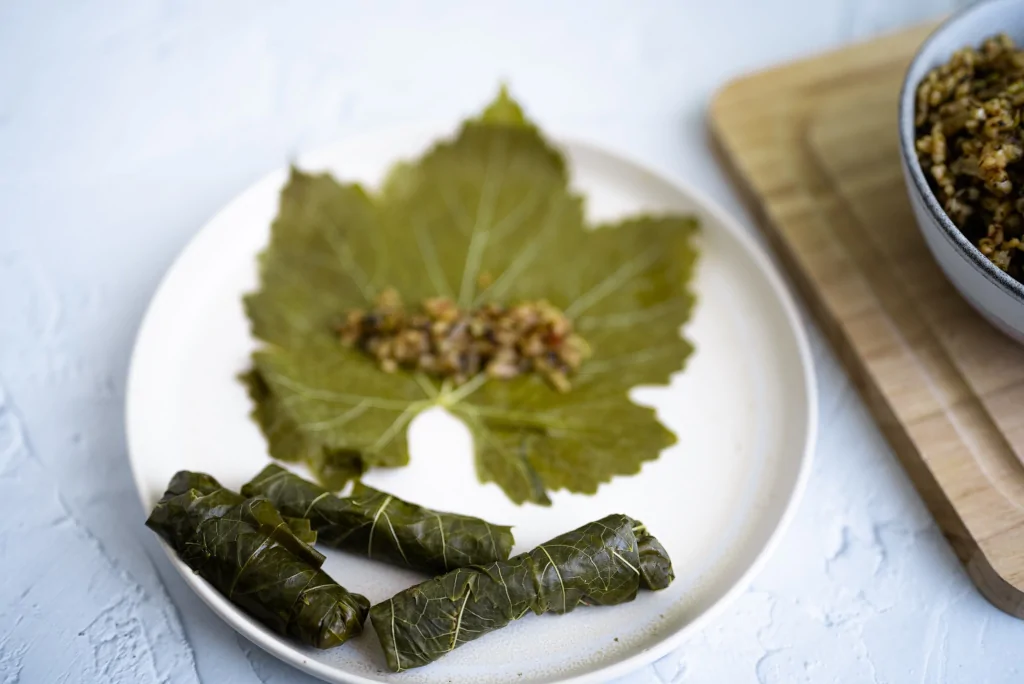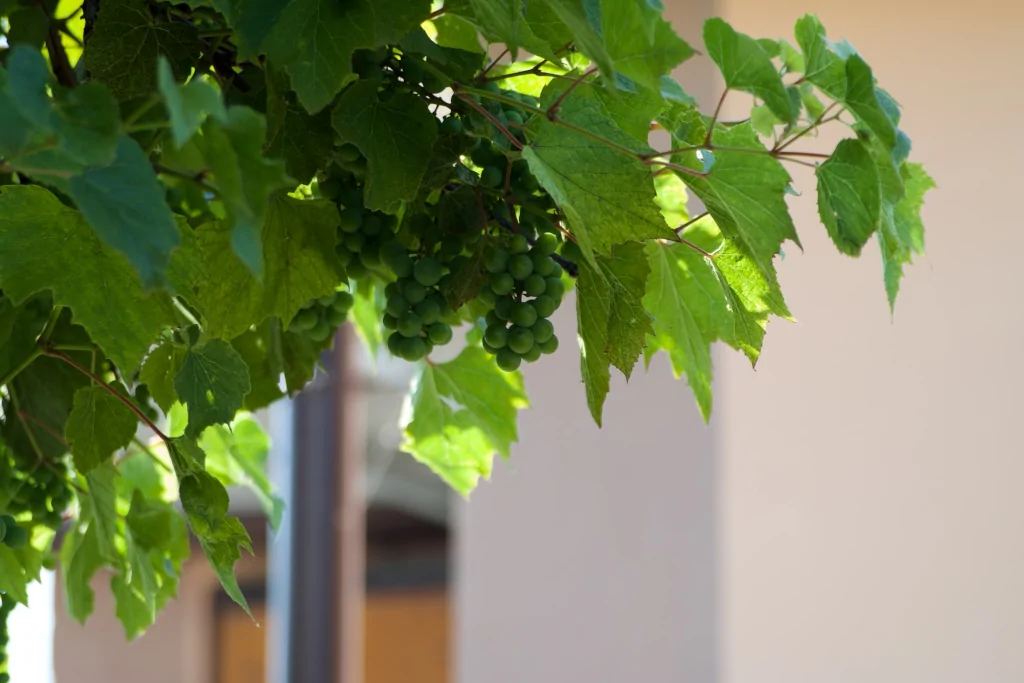The mysterious relationship between dogs and grape leaves leaves many pet owners puzzled. Are these seemingly harmless leaves a threat to your furry friend’s health?
Dive into this article to learn more about grape toxicity, its symptoms, and how to protect your four-legged companion from potential dangers.

Are Grape Leaves Toxic to Dogs?
There is no known study showing that grapes leaves are toxic to dogs. However, while grape leaves themselves are not typically considered toxic to dogs, it’s crucial to understand that grapes and their byproducts are extremely dangerous.
Since grape leaves are often associated with grapes, many pet owners may be hesitant to expose their dogs to them. Various sources claim both ways, but so far, we know this:
If your dog consumes grape leaves without ingesting grapes or their derivatives, they should be safe. For example, if you were making stuffed grape leaves, and you gave one to your dog. In this case, your dog should be fine.
However, if your dog at the leaves from the vine, they may have ingested some grapes as well. Therefore, it’s best to stay alert in these situations.
In general, it’s best to err on the side of caution, and avoid feeding your dog stuffed grape leaves in large quantities.
Why Are Grapes Dangerous for Dogs?
Grapes and their derivatives, including raisins, are highly toxic to dogs due to an unknown substance that can cause severe kidney damage or even kidney failure.
This toxicity is not dose-dependent, meaning that even small amounts can lead to life-threatening complications.
Veterinarians from the ASPCA Poison Control Center (APCC) recently identified tartaric acid as the culprit, solving a long-standing mystery surrounding grape toxicity in dogs.
The consequences of ingesting grapes or raisins are well-documented and potentially fatal.
How to Recognize Symptoms of Grape Toxicity
Recognizing the symptoms of grape toxicity in dogs is crucial for timely intervention and effective treatment. Here are the key symptoms to watch out for:
- Vomiting. One of the first and most common signs of grape toxicity is vomiting, which can sometimes contain grape pieces or raisins.
- Diarrhea. Another early symptom is diarrhea, which may also include a foul odor and the presence of blood.
- Lethargy. Affected dogs may exhibit weakness, fatigue, and a general lack of energy.
- Loss of appetite. Dogs suffering from grape toxicity often lose interest in food and may refuse to eat altogether.
- Abdominal pain. If your dog is experiencing discomfort or pain in their abdomen, it could be a sign of grape toxicity.
- Increased thirst and urination. Dogs with grape toxicity might drink excessive amounts of water and have an increased frequency of urination.
- Dehydration. As a result of increased urination and vomiting, affected dogs can become dehydrated.
- Tremors or seizures. In severe cases, dogs may exhibit tremors or seizures as a result of grape toxicity.
Suggested read: Dog Poisoning Signs, and What to Do

What Should I Do if My Dog Ingests Grape Leaves?
While grape leaves are not toxic to dogs, it’s important to monitor your pet for any unusual symptoms or signs of distress, as they may have accidentally ingested grapes or raisins in the process.
If you’re unsure whether your dog has consumed grapes or grape products, or if they are exhibiting any concerning symptoms, it’s essential to take action immediately:
- Contact your veterinarian. If you suspect your dog has ingested grapes, raisins, or any grape-related products, immediately call your veterinarian or an emergency animal clinic for advice.
- Keep an eye on your dog. Closely monitor your dog for any signs of grape toxicity, as listed in the previous section.
- Don’t induce vomiting without consulting a professional. Never attempt to induce vomiting in your dog without first consulting a veterinarian, as doing so can cause additional harm.
- Provide fresh water. Ensure your dog has access to fresh water to help prevent dehydration if they are vomiting or experiencing diarrhea.
- Be prepared for a vet visit. If your veterinarian advises you to bring your dog in for an examination or treatment, be prepared to provide details on the situation, including the amount and type of grapes or grape products consumed, and any symptoms your dog is experiencing.
Leaving objects around for dogs to eat is never a good idea. I’ve seen them try to eat anything, from silly string and avocados to permanent markers.
Safe and Healthy Alternatives for Dog Treats
It’s essential to provide your dog with safe and healthy treats to keep them happy and well-nourished. Some great alternatives to grapes or grape-related products include:
Carrots are an excellent source of vitamins, minerals, and fiber. They make for a fantastic, low-fat snack that can also help clean your dog’s teeth.
Cooked, plain pumpkin is a fantastic source of fiber and can aid in digestion. Just avoid canned pumpkin with added sugar or spices. There are lots of homemade treats to be made for your dog to enjoy that are healthy and easy to digest, so check them out.
My dog Sam loves apple slices as a crunchy, low-calorie treat. Just remember to remove the seeds and core before feeding them to your dog, as they can pose a choking hazard or contain harmful substances.
Packed with antioxidants, blueberries can be a delicious and nutritious treat for your dog. Charlie, my untrained dog, goes crazy for these sweet little berries!
Low in calories and high in fiber, green beans are a healthy snack that can help maintain your dog’s weight.
All of these can be great, not just as alternatives, but as regular diet items for your dog. As long as you keep in mind their health and pay attention to what they eat, you will keep your dog happy and healthy for a long time.
FAQs
Can grape seeds or skin also be toxic to dogs?
Grape seeds and skin can also be toxic to dogs, as they contain the same harmful substances found in the grape itself.
What other fruits or vegetables are toxic to dogs?
Other fruits and vegetables toxic to dogs include onions, garlic, avocados, cherries, and unripe tomatoes.
How quickly should I contact a vet if my dog ingests grapes?
If your dog ingests grapes, contact your veterinarian or an emergency animal clinic immediately, as prompt treatment can improve the chances of a successful recovery.
Can dogs develop an allergy to grape leaves?
While it’s uncommon for dogs to develop an allergy to grape leaves, it’s possible for them to be allergic to any plant or food item. If you notice any signs of an allergic reaction, consult your veterinarian.
Alex, a passionate animal lover, has experience in training and understanding animal behavior. As a proud pet parent to two dogs and three cats, he founded AnimalReport.net to share insights from animal experts and expand his knowledge of the animal kingdom.




